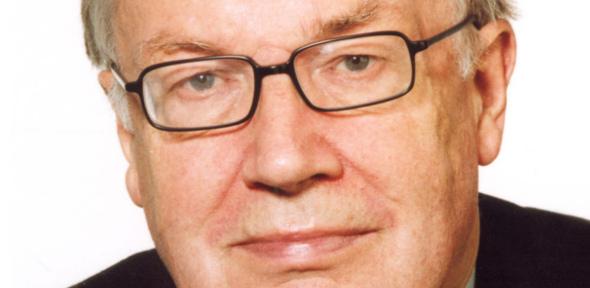
Professor Andrew C. Palmer, an Emeritus Professor of the Department, has received an honorary doctor of science degree at Clarkson University's 114th Commencement. The degree was awarded "for his exceptional contributions to pipeline and offshore engineering, his years of dedicated guidance of students of engineering, and his notable successes as both an academician and a businessman."
When you feel unhappy, the remedy is to learn something new.
Professor Andrew C. Palmer quoting T. H. White
Professor Palmer addressed the Clarkson University class of 2007 telling them that although he may not have the expected uplifting and instructive graduation message for them, he would leave them with three thoughts: "When you look back on your life, you don't regret the things you have done, only the things you haven't done," he said. Second was a quote from the author, T. H. White: "When you feel unhappy, the remedy is to learn something new." His final thought was an inspiration from George Fox, one of the founders of the Society of Friends - the Quakers. Fox went on a mission to South Wales and climbed to the top of a mountain, where he had a religious experience. Descending from the mountain, he gave a sermon and told the faithful, "Go cheerfully through the world and speak to that of God in every man." Palmer said he wasn't certain he could define God, "but I can say to you, go cheerfully and speak to that of goodness in every man."
Professor Palmer is the world's leading authority on the incremental movement of pipes on the sea bed as a result of cyclic pressure and temperature changes - an area in which his knowledge of soil mechanics, stability theory and non-linear analysis makes him a unique expert. He is also known for his contributions to pipelines and the offshore industry, his work as a Professor of engineering and his successes in engineering consulting.
Professor Palmer earned his bachelor's degree in engineering from Cambridge University in 1961, and after completing his PhD at Brown University in the USA, followed by a spell at University of Liverpool, he returned as a lecturer in 1967. Wanting to try real engineering, in 1975 he joined a consultancy firm, R.J. Brown and Associates, the leading consultant in underwater pipelines. He worked on underwater ploughs, ice mechanics and new techniques for Arctic pipeline construction. He was the project manager for the first Arctic offshore pipeline, built off the coast of Melville Island in Canada.
In 1970 he advised BP on a soil-structure interaction problem, the effect of thawing permafrost on the Trans-Alaska oil pipeline. A year later BP asked him about a structural analysis problem in the construction of the Forties pipeline, the first North Sea pipeline in what was then thought of as deep water. "That sounds interesting", he replied "but I don't know anything about underwater pipelines"."We think that's an advantage", BP replied "you'll bring a fresh mind to it. Come and see us tomorrow". That telephone call changed his life.
After another spell in academia, as Professor of Civil Engineering at University of Manchester Institute of Science and Technology (UMIST) (1979-82), he again departed to the immediacy of consultancy work, eventually setting up his own company in 1985.
He founded Andrew Palmer and Associates, a company of consulting engineers who specialise in marine pipelines and have been engaged in pipeline projects on every continent. After selling his company in 1993, Palmer remained as technical director until he returned to university teaching as Jafar Research Professor of Petroleum Engineering at Cambridge University in 1996. He was a visiting professor in the Division of Engineering and Applied Sciences at Harvard University in 2002-2003. He retired from Cambridge in 2005 and is now Keppel Chair Professor in the Department of Civil Engineering at the National University of Singapore.
Professor Palmer is a Fellow of the Royal Society, a Fellow of the Royal Academy of Engineering, a Fellow of the Institution of Civil Engineers, a Chartered Engineer, a member of the Society of Petroleum Engineers and a member of the Academy of Experts.
He is the author of three books and more than 180 papers on pipelines, offshore engineering, geotechnics and ice.

